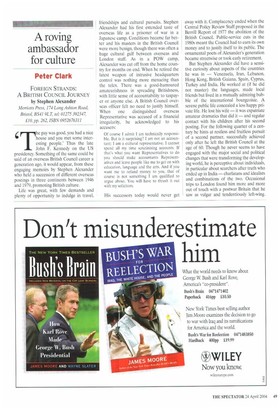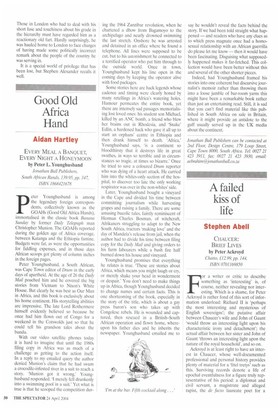A roving ambassador for culture
Peter Clark
FOREIGN STRANDS: A BRITISH COUNCIL JOURNEY by Stephen Alexander Meffiotts Press, 174 Long Ashton Road, Bristol, BS41 9L T, tel: 01275 392347, .110, pp. 262, ISBN 0952676311 4 he pay was good, you had a nice
house and you met some inter house and you met some inter esting people.' Thus the late John F. Kennedy on the US presidency. Something of the same could be said of an overseas British Council career a generation ago, it would appear, from these engaging memoirs by Stephen Alexander who held a succession of different overseas postings in three continents between 1946 and 1979, promoting British culture.
Life was great, with few demands and plenty of opportunity to indulge in travel, friendships and cultural pursuits. Stephen Alexander had his first extended taste of overseas life as a prisoner of war in a Japanese camp. Conditions became far better and his masters in the British Council were more benign, though there was often a huge cultural gulf between overseas and London staff. As in a POW camp, Alexander was cut off from the home country for months on end. When he retired the latest weapon of intrusive headquarters control was nothing more menacing than the telex. There was a good-humoured amateurishness in spreading Britishness, with little sense of accountability to taxpayer or anyone else. A British Council overseas officer felt no need to justify himself. When one distinguished overseas Representative was accused of a financial irregularity, he acknowledged to his accusers:
Of course I admit I am technically responsible. But is it surprising? I am not an accountant: I am a cultural representative. I cannot spend all my time scrutinising accounts. If that's what you want Representatives to do you should make accountants Representatives and leave people like me to get on with education, language and the arts. And if you want me to refund money to you, that of course is not something I am qualified to argue about. You will have to thrash it out with my solicitors.
His successors today would never get away with it. Complacency ended when the Central Policy Review Staff proposed in the Berrill Report of 1977 the abolition of the British Council. Public-service cuts in the 1980s meant the Council had to earn its own money and to justify itself to its public. The ornamental poets of Alexander's generation became streetwise or took early retirement.
But Stephen Alexander did have a sensitive curiosity about aspects of the countries he was in — Venezuela, Iran, Lebanon, Hong Kong, British Guiana, Spain, Cyprus, Turkey and India. He worked at (if he did not master) the languages, made local friends but lived in a mutually admiring bubble of the international bourgeoisie. A serene public life concealed a less happy private life. He lost his wife — it was expatriate amateur dramatics that did it — and regular contact with his children after his second posting. For the following quarter of a century he hints at restless and fruitless pursuit of a second partner, successfully achieved only after he left the British Council at the age of 60. Though he never seems to have engaged with the major social and political changes that were transforming the developing world, he is perceptive about individuals, in particular about searchers after truth who ended up in India — charlatans and idealists and combinations of the two. Occasional trips to London found him more and more out of touch with a postwar Britain that he saw as vulgar and tendentiously left-wing.
Those in London who had to deal with his short fuse and touchiness about his grade in the hierarchy must have regarded him as a reactionary old fart. Hardly surprisingly, he was hauled home to London to face charges of having made some politically incorrect remark about the people of the country he was serving in. It is a special world of privilege that has been lost. but Stephen Alexander recalls it well.



















































































 Previous page
Previous page